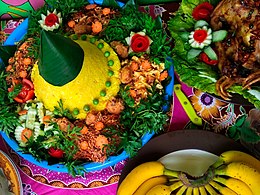
Back Gastronomia de Padang Catalan Padang-Küche German آشپزی پادانگ Persian Cuisine de Padang French पदांग व्यंजन Hindi Masakan Minang ID パダン料理 Japanese Dhaharan Padang JV Masakan Minang MIN Masakan Padang Malay

 |
| This article is part of the series on |
| Indonesian cuisine Masakan Indonesia |
|---|
|
|
Padang dish or Minangkabau dish is the cuisine of the Minangkabau people of West Sumatra, Indonesia. It is among the most popular cuisines in Maritime Southeast Asia. It is known across Indonesia as Masakan Padang (Padang cuisine) after Padang, the capital city of Western Sumatra province.[1] It is served in restaurants mostly owned by perantauan (migrating) Minangkabau people in Indonesian cities. Padang food is ubiquitous in Indonesian cities and is popular in neighboring Malaysia and Singapore.
Padang food is famous for its use of coconut milk and spicy chili.[2] Minang cuisine consists of three main elements: gulai (curry), lado (chili pepper) and bareh (rice).[3] Among the cooking traditions in Indonesian cuisine, Minangkabau cuisine and most of Sumatran cuisine are under the influences of Indian and Middle Eastern cuisine, with dishes cooked in curry sauce with coconut milk and a lot of spice mixes.

Because most Minangkabau people are Muslims, Minangkabau cuisine follows halal dietary law rigorously. Most of its protein is taken from beef, chicken, water buffalo, goat, lamb, mutton, and poultry and fish. Minangkabau people are known for their fondness of cattle meat products including offal. Almost all the parts of cattle are used in Minangkabau dishes. Seafood is popular in coastal West Sumatran cities, and most are grilled or fried with spicy chili sauce or in curry gravy. Fish, shrimp, and cuttlefish are cooked in similar fashion. Most Minangkabau food is eaten with hot steamed rice or compressed rice such as katupek (ketupat). Vegetables are mostly boiled, such as boiled cassava leaf, or simmered in thin curry as side dishes, such as gulai of young jackfruit or cabbages.
- ^ "A Unique of Padang". Padangbaycity.com. Archived from the original on 2010-12-14. Retrieved 2010-09-22.
- ^ "Marco's Bofet: Authentic Padang food". The Jakarta Post. Archived from the original on 2010-09-14. Retrieved 2010-09-22.
- ^ Donny Syofyan (24 November 2013). "By the way ... I just can't live without Padang food". The Jakarta Post.
© MMXXIII Rich X Search. We shall prevail. All rights reserved. Rich X Search